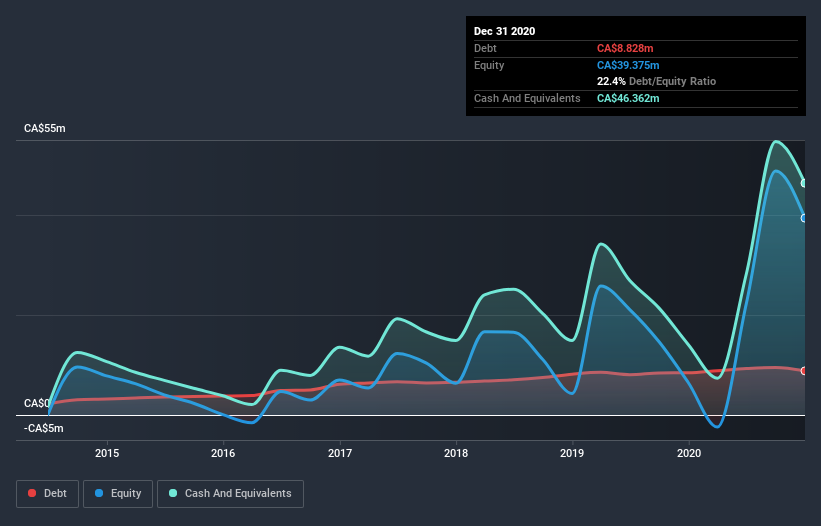Is IMV (TSE:IMV) A Risky Investment?
The external fund manager backed by Berkshire Hathaway's Charlie Munger, Li Lu, makes no bones about it when he says 'The biggest investment risk is not the volatility of prices, but whether you will suffer a permanent loss of capital.' It's only natural to consider a company's balance sheet when you examine how risky it is, since debt is often involved when a business collapses. As with many other companies IMV Inc. (TSE:IMV) makes use of debt. But the more important question is: how much risk is that debt creating?
Why Does Debt Bring Risk?
Debt is a tool to help businesses grow, but if a business is incapable of paying off its lenders, then it exists at their mercy. Ultimately, if the company can't fulfill its legal obligations to repay debt, shareholders could walk away with nothing. However, a more usual (but still expensive) situation is where a company must dilute shareholders at a cheap share price simply to get debt under control. By replacing dilution, though, debt can be an extremely good tool for businesses that need capital to invest in growth at high rates of return. When we examine debt levels, we first consider both cash and debt levels, together.
View our latest analysis for IMV
How Much Debt Does IMV Carry?
As you can see below, at the end of December 2020, IMV had CA$8.83m of debt, up from CA$8.46m a year ago. Click the image for more detail. However, it does have CA$46.4m in cash offsetting this, leading to net cash of CA$37.5m.
How Strong Is IMV's Balance Sheet?
According to the last reported balance sheet, IMV had liabilities of CA$10.5m due within 12 months, and liabilities of CA$8.95m due beyond 12 months. Offsetting this, it had CA$46.4m in cash and CA$3.95m in receivables that were due within 12 months. So it can boast CA$30.9m more liquid assets than total liabilities.
This surplus suggests that IMV has a conservative balance sheet, and could probably eliminate its debt without much difficulty. Succinctly put, IMV boasts net cash, so it's fair to say it does not have a heavy debt load! When analysing debt levels, the balance sheet is the obvious place to start. But ultimately the future profitability of the business will decide if IMV can strengthen its balance sheet over time. So if you want to see what the professionals think, you might find this free report on analyst profit forecasts to be interesting.
Since IMV doesn't have significant operating revenue, shareholders may be hoping it comes up with a great new product, before it runs out of money.
So How Risky Is IMV?
We have no doubt that loss making companies are, in general, riskier than profitable ones. And we do note that IMV had an earnings before interest and tax (EBIT) loss, over the last year. Indeed, in that time it burnt through CA$35m of cash and made a loss of CA$35m. With only CA$37.5m on the balance sheet, it would appear that its going to need to raise capital again soon. Even though its balance sheet seems sufficiently liquid, debt always makes us a little nervous if a company doesn't produce free cash flow regularly. The balance sheet is clearly the area to focus on when you are analysing debt. But ultimately, every company can contain risks that exist outside of the balance sheet. For instance, we've identified 4 warning signs for IMV (1 doesn't sit too well with us) you should be aware of.
If, after all that, you're more interested in a fast growing company with a rock-solid balance sheet, then check out our list of net cash growth stocks without delay.
This article by Simply Wall St is general in nature. It does not constitute a recommendation to buy or sell any stock, and does not take account of your objectives, or your financial situation. We aim to bring you long-term focused analysis driven by fundamental data. Note that our analysis may not factor in the latest price-sensitive company announcements or qualitative material. Simply Wall St has no position in any stocks mentioned.
Have feedback on this article? Concerned about the content? Get in touch with us directly. Alternatively, email editorial-team (at) simplywallst.com.

 Yahoo Finance
Yahoo Finance 
